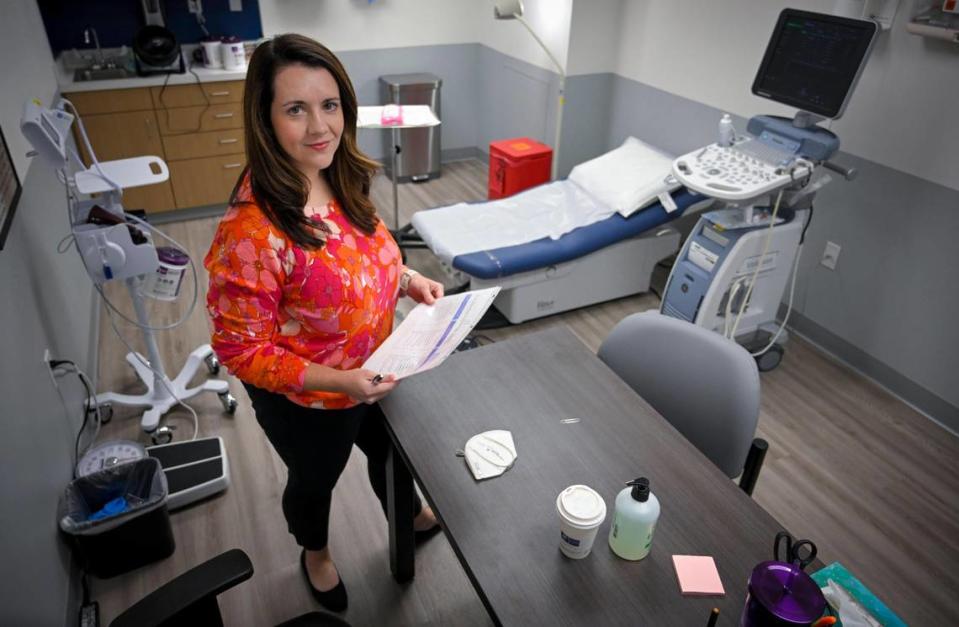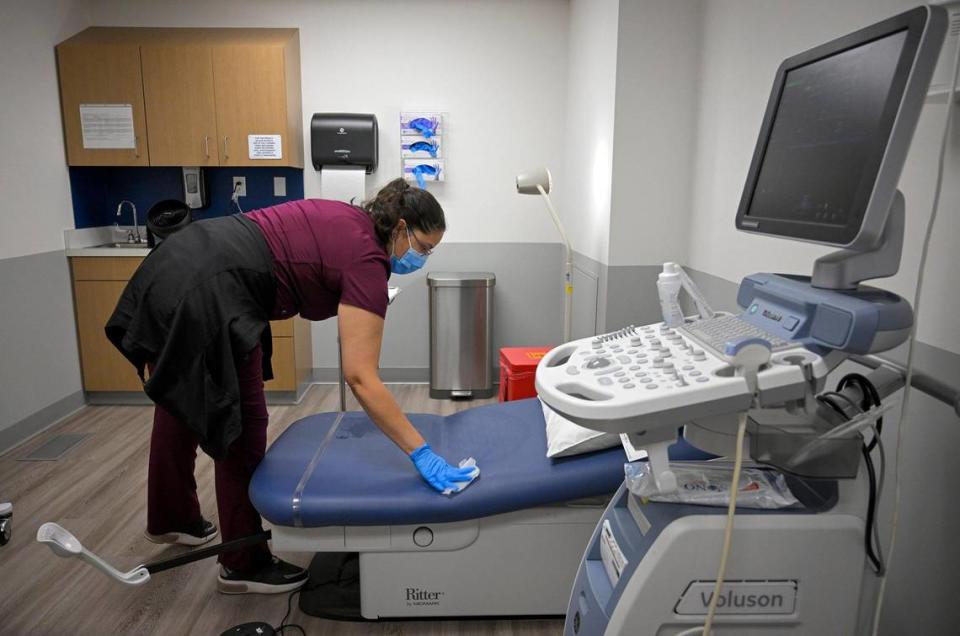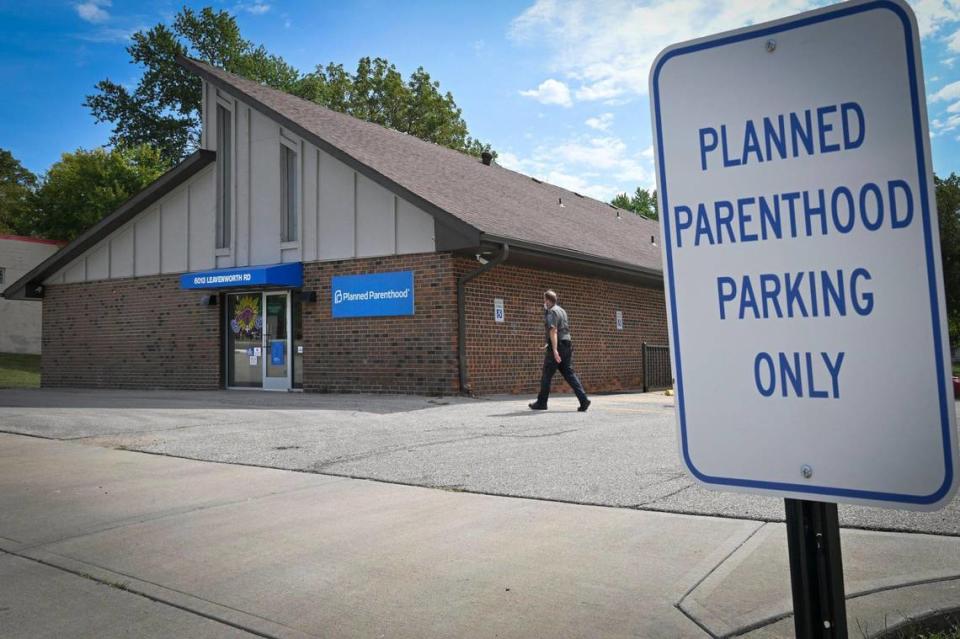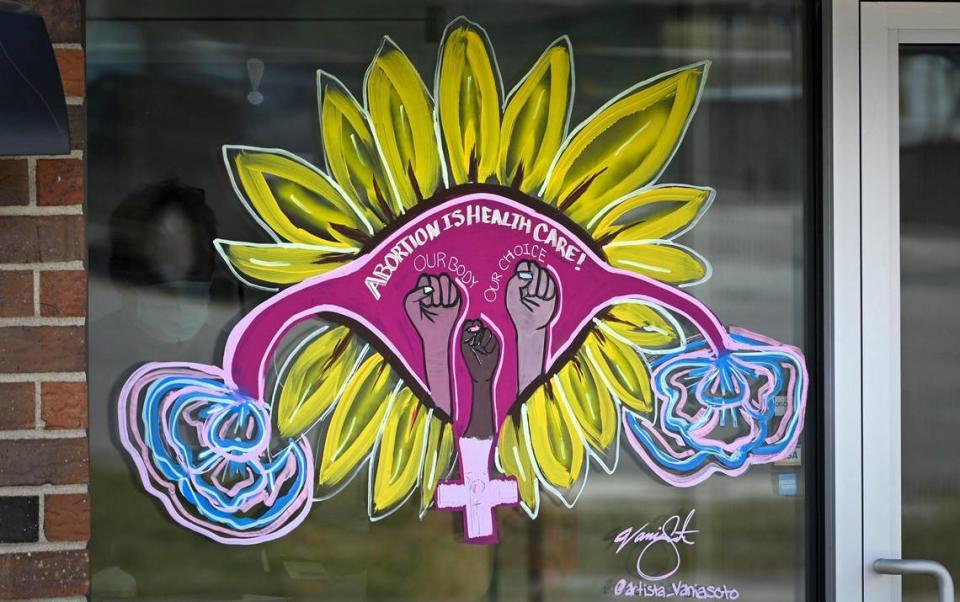‘Eye of the storm’: Planned Parenthood in Kansas can’t keep up with abortion demand
The new Planned Parenthood health center in Kansas City, Kansas, was designed to be brightly lit and friendly, a comfortable space for patients to have those often-uncomfortable conversations about their sexual and reproductive health needs.
Some of the exam rooms are extra-large for patients who bring their children with them. The nurses’ station is a beehive of activity where nurses in Planned Parenthood-blue uniforms hustled one afternoon last week. Just down the hall, the waiting room was full.
But most of the women who want to come here for abortion services will never see the inside of this building on Leavenworth Road.
Demand for abortion is so high in Kansas right now, Planned Parenthood Great Plains can only see 10% to 15% of patients requesting appointments, officials told The Star. Planned Parenthood runs three of the five health centers that provide abortion services in the state. The KCK clinic, which opened in June, is the newest.
“The awful thing about this moment is the worst-case scenario is happening more frequently than the good scenarios. And that is the reality of abortion care in this part of the country today,” said Emily Wales, president and CEO of Planned Parenthood Great Plains.
“We are seeing somewhere between 10- and 15% of the patients who call us for appointments. There is a terrible element of playing the lottery and for many patients you are losing because we do not have enough appointments to serve the people who need us.”

The Great Plains affiliate operates clinics in Kansas, Missouri, Oklahoma and Arkansas. Kansas is the only one of those states that hasn’t banned or severely limited abortion. Voters didn’t want that.
In August, in the first ballot test of abortion rights in a post-Roe America, a historic number of Kansas primary voters overwhelmingly rejected a constitutional amendment that could have opened the door for state lawmakers to further restrict or ban abortions.
Watching abortion rights fall like dominoes in nearby states, Planned Parenthood officials kept their eye on Kansas, “the one source of hope,” said Wales. “We feel a little bit like we have lived right in the eye of the storm and seen every part of this.
“The good news is we came out in a position in Kansas where we at least can be providing care — 10% is not enough, but 10% is more than nothing, which is what some of our states have.”
Yet staff members are having to refer more and more patients elsewhere, to Illinois or New Mexico or Colorado or wherever else abortion appointments are available. “And that is the part that is shocking to people,” said Wales, who said she’s up at night thinking about the number of people who call seeking care who don’t get it.
“I think there’s a perception that the states that still have legal care will be able to accommodate all the people with need, but that’s not true. And for a lot of patients, it might be feasible for them to think about getting to Wichita, or even Kansas City,” said Wales.
“But when you say you’re going to have to get to Illinois or maybe Denver, that is overwhelming. Especially if you’ve got two or three kids at home and you are juggling a job and other parts of your life.
“We do have patients who end their calls devastated because they are trying to make the decision — can I get far enough out from where I live to get care or am I not going to be able to get care I deserve?”

Scrambling for care
Planned Parenthood is seeing more patients who are traveling far from home to get an abortion, “and a lot of times their lives are already complicated and you add on top of that a 10- or 12-hour trip,” Wales said.
“So we have patients who come with kids in a car. They are really concerned about missing one shift from work and the possibility that if they get delayed or can’t get back on the road it’s going to be a second day of work missed.
“So the chaos now is in trying to support and be affirming to people but also knowing that we don’t have enough appointments to get everybody in and certainly not in the short time frame some of these patients need. So we are doing a lot of emotional support to patients in this really sad moment.”
Most of the demand still comes from Kansas and Missouri residents, Wales said. It’s easier for them to get to the clinics during the week; weekend appointments are sought by patients traveling from miles away.
“We are seeing increasingly high numbers of Texans. I think that’s just a matter of state size. Texas is a huge state and they’re having a lot of patients who have to go somewhere for care,” Wales said.
“We do see quite a few Oklahomans. Those would be the biggest four states. And then a handful of patients from other states. On occasion we do see someone from Arkansas, sometimes from Louisiana.”

During the Kansas election, advocates for the amendment tried to convince voters that abortion would be unregulated and uninhibited in Kansas without the change to the state constitution, warning that Kansas would become an abortion destination in the Midwest. In effect, that’s exactly what has happened.
“Sadly, overwhelmed abortion clinics in Kansas come as no surprise,” Lucrecia Nold, public policy specialist for the Kansas Catholic Conference, told The Star in a statement.
Nold said the rising number of abortions “is not authentic care for women and their preborn babies. This distressing development highlights the need for the care offered by pregnancy resource centers.”
The centers are non-profit operations with a Christian-based mission of talking women away from abortion and offering them resources during and after their pregnancies. Criticized for positioning themselves as medical clinics, which detractors say they are not, there are about 2,500 in the United States, about a dozen in the Kansas City metro area.
For Planned Parenthood, Wales said it is a “huge relief to say to someone, wherever you live, you have rights (in Kansas) that are recognized and you can make your own medical decisions.”
Wales said people didn’t feel comfortable “on many levels, with the idea of people traveling here for care. … It’s true that I think people are going to have to adjust and get used to the fact that we are seen as a state with more rights, more freedom, more respect for patients than all kinds of surrounding states.”
To meet the demand, the clinics have lengthened their hours. The Planned Parenthood in Overland Park is now open on Sundays. But it’s a balancing act for Planned Parenthood officials who don’t want to make changes to accommodate the demand for abortions at the expense of the other services they provide.
Day in and day out, more patients come for the bread-and-butter services — birth control, testing for sexually transmitted infections, breast cancer screenings. The demand for appointments at the new KCK clinic “was immediate, and not just for abortion services,” Wales said.
The quick demand scuttled plans for a restaurant-like “soft opening,” a quiet time when the staff can get acclimated and identify potential problems. “And here we haven’t had a ton of that because we just had such a high need that we needed to staff quickly to get up to regular schedules. So we’re doing all we can,” Wales said.

Keeping abortion protesters at bay
By coincidence, the health center in Wyandotte County opened the same week Roe v. Wade fell in late June, giving staff members “a crash course” in having to explain to callers what the decision meant, Wales said.
“But we’ve been talking about a Wyandotte County facility since 2018. We actually had a lease on another building where the landlord started getting some threats, there were some security concerns, so we moved away from the idea of leasing a space and decided our commitment to Wyandotte County is long-term, so we were going to buy and renovate, and it took a long time, especially with the pandemic in the middle,” she said.
Planned Parenthood identified a huge disparity between the number of health care providers in Wyandotte County compared to Johnson County, where it operates its other clinic in the metro. It also operates three health centers in Missouri where patients are primarily low-income and often Medicaid recipients. (Those can no longer provide abortions.)
They chose a building that had been a medical center in a previous life that fit their unusual needs. For one thing they needed a parking lot big enough to keep some distance between patients and protesters, and it had to be close to bus routes.
“A lot of our patients are not here for abortions, so if you are coming in to get an IUD or birth control, and someone is screaming at you, it can be pretty off-putting,” said Wales. “And a lot of our patients are young, so they may be 20 and they can’t figure out why there are older white men screaming at them in the parking lot.”
The staff and building itself are less than half the size of the clinic in Overland Park, which has surgical facilities and provides in-clinic abortions. The WyCo clinic provides only medication abortions, also known as the abortion pill — actually two medications that work up to 11 weeks of pregnancy.
“For some patients, medication abortion is strongly preferred,” said Wales. “They may have anxiety about having an in-clinic procedure. They may be a victim of trauma and not want to go through an in-clinic procedure.
“But for other patients, especially those who are traveling, they don’t want to be on the road home when they begin to have cramping and experience part of the process of medication abortion. So some of them prefer to get a procedure that is in-clinic so they know when they leave that their process is done.”

Don’t know full impact yet
Wales said there are no immediate plans to build new clinics to meet the demand. “We had two facilities in Kansas for a long time, so even having three is a pretty big change for us,” she said.
“So we’re going to try to be thoughtful about what we do next and we’re looking really seriously at whether we need to open another center or whether we can increase appointment access at our current facilities, because the most important thing for our patients is that we are efficient in seeing them, but also seeing them well.
“We’re not going to sacrifice any level of quality or care, at the expense of getting more people in.”
But Planned Parenthood is looking at the trends of where patients are traveling from. And right now, most of them are coming from south of Kansas.
“So where we need to create access is largely from people coming to the north. That’s why for us expanding hours and having more providers in the Wichita area is really critical,” she said.
She worries about the patients they can’t accommodate, the ones who don’t follow through on referrals and alternatives her staff provides.
“The idea that you are going to have all kinds of members of communities who would have made different choices for themselves, for their families, for their education, their career, I don’t know how that’s going to play out for people,” she said.
“And a lot of times our patients are making what they think are the best decisions for them … for their other children, their needs for their families, and it’s absolutely going to change the dynamic.
“And it’s not at all uncommon that we have patients who say I am choosing not to go forward with this pregnancy because of intimate partner violence or because it’s the healthiest thing for me in a really difficult relationship. And they can’t get care, so they’re going to be affiliated with someone that may be really dangerous for them.
“There are going to be consequences for generations.”
The Great Plains organization made an unprecedented move earlier this month to shut down all its clinics and send employees home for a break, much-needed at that point, said Wales.
Employees were told of the break in June, partly because officials anticipated the Supreme Court’s Roe v. Wade decision, and because clinic employees in Oklahoma were already slammed trying to fill demand for abortion services from Texas residents.
“We told people don’t be available. Try to take care of yourselves,” she said. “And people did take advantage of that. A lot of people went and saw family that they had put off during this wild year. And a lot of people slept, myself included. Then try to come back and be prepared, because the fight is far from over.”


